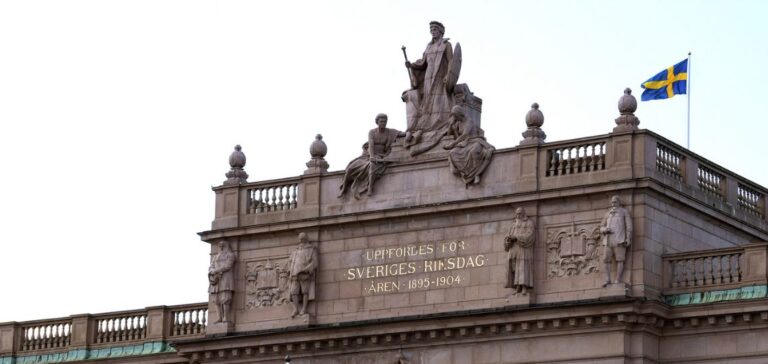With the unprecedented support of the far right, the Swedish right wing announced on Friday an agreement to form a government that intends, among other things, to revive nuclear energy in the country in reverse.
“The Moderates (Conservatives), the Christian Democrats and the Liberals will form a government and cooperate with the Sweden Democrats (far right) in parliament,” said Conservative Party leader Ulf Kristersson at a press conference Friday.
A vote to appoint Mr. Kristersson as Prime Minister will take place on Monday and the new team is expected to take office the following day.
The partners unveiled a roadmap that includes measures to fight crime and reduce immigration, as well as a revival of nuclear energy, which Sweden has shied away from in recent decades.
“New nuclear reactors will be built,” said the leader of the Christian Democratic Party, Ebba Busch, during the presentation of the new team.
In recent years, the Scandinavian kingdom has closed six of its 12 reactors.
Those still in operation produce about 30% of the electricity used in the country today.
The upheaval in the energy market caused by the war in Ukraine has reopened the debate on the future of energy policy in Sweden, as in other European countries.
The outgoing social democratic party, in power for eight years, was officially opposed to the construction of new reactors.
Earlier this year, however, they had given more positive signals by validating the creation of a final storage center for nuclear waste earlier this year.
In June, the Vattenfall Group also announced that it was considering building small nuclear reactors in Sweden to meet the growing demand for electricity.
– Return of the right –
After eight years of social-democratic government, the right-wing is back in charge in Sweden after an unprecedented rapprochement with the Sweden Democrats (SD), who won the September 11 elections with a record 20.5% of the vote.
If it does not join the government – an option rejected by the other right-wing parties – the party led for 17 years by Jimmie Åkesson is the main parliamentary force in the new majority and the second largest in the country, with 73 seats.
Adding the Moderates (68 seats), the Christian Democrats (19) and the Liberals (16), the “constellation” of the Right has a narrow absolute majority of 176 seats.
Now led by the Social Democrats (107 seats) of outgoing Prime Minister Magdalena Andersson, the opposition has 173 seats.
Ms. Andersson does not despair of returning to power if the right implodes.
After an election so close that the final results had to wait three days, Ulf Kristersson was asked on September 19 to form a government by the Speaker of the Swedish Parliament, Andreas Norlén.
By Wednesday, Ulf Kristersson had been given two more days to complete the negotiations on the right, which turned out to be more complicated than analysts thought.
The great challenge for the new government was to reconcile the expectations of the small Liberal party, whose red line was the accession of the far right to government, with the influence of the Sweden Democrats, who claimed cabinet posts.
“We would have liked to see a majority government in which we would have participated,” said Jimmie Åkesson at the joint press conference of the four right-wing parties.
“So it is very important for us that we have a comprehensive agreement on political issues,” he added.
The arrival of the SDs in a majority, even if informal, in Sweden is an earthquake in the country’s political life, 12 years after they entered Parliament with 5.7% of the vote.
Created in 1988 from the ashes of a neo-Nazi group, the far-right party has gradually become commonplace in the political landscape, against a backdrop of high levels of non-European immigration.






















